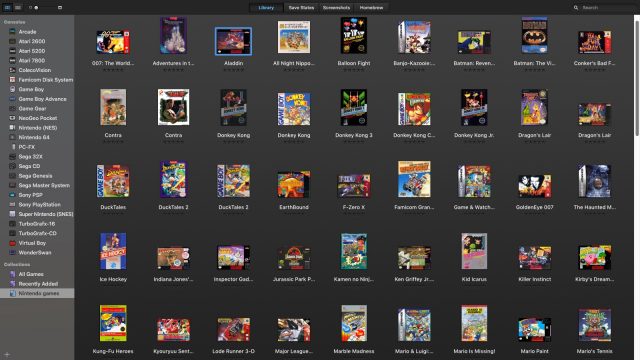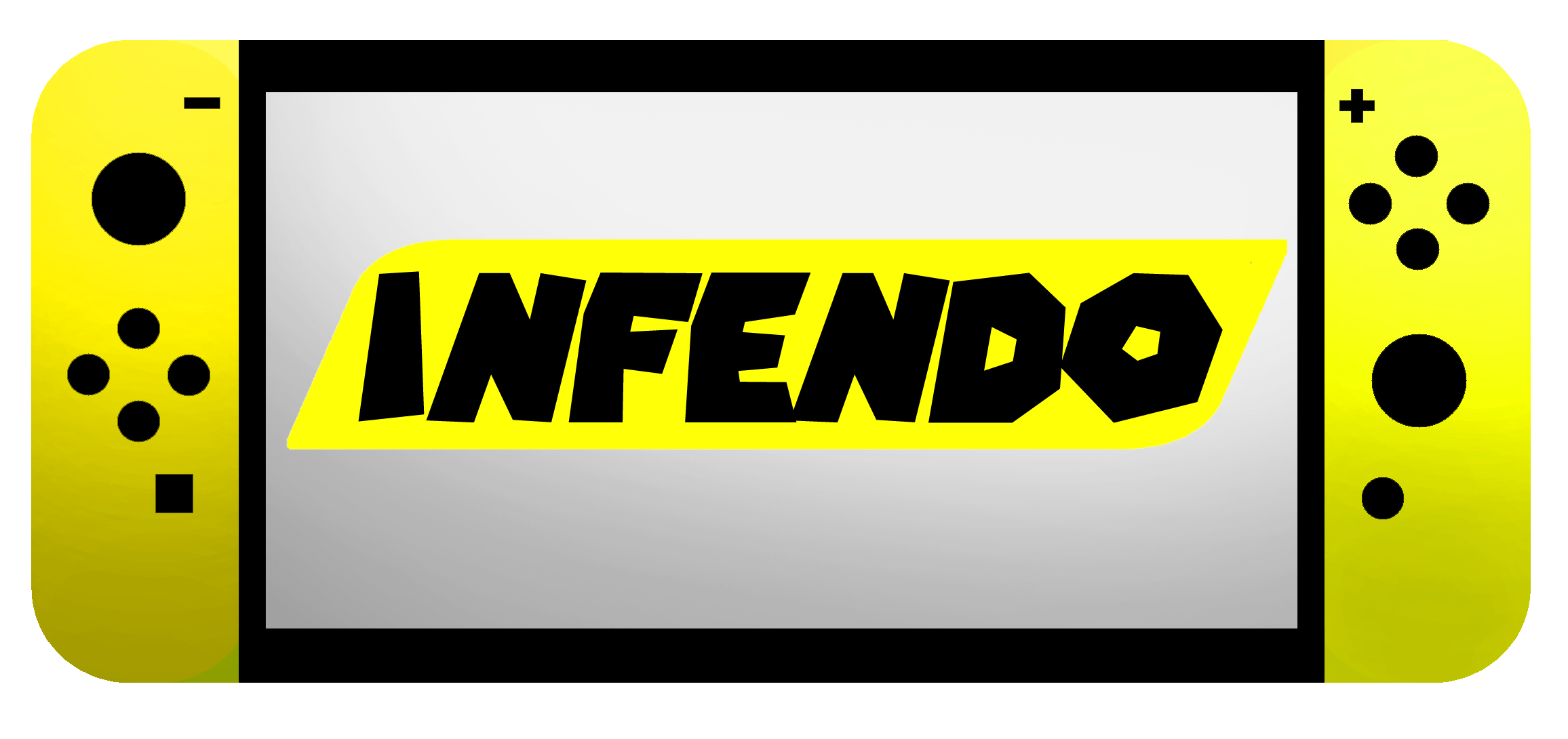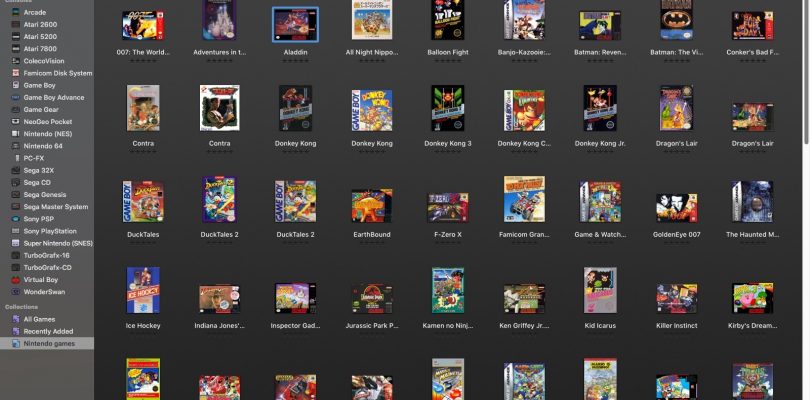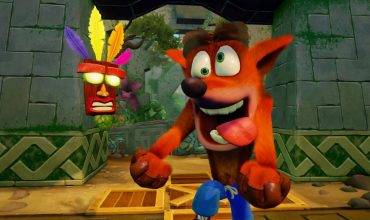I think it’s safe to assume that most gamers have dabbled in emulation at one point or another. It’s a quick and easy way to play rare, foreign, and classic games. It is also a handy way to keep all of those games together without taking up a lot of physical space. To its detractors, emulation is as bad as stealing. You’re playing a game you didn’t pay for on hardware the company didn’t manufacture, license, or legally sanction.

Just some of the Nintendo games in my OpenEmu Library
It’s the perpetual battle. Is emulation legal, or isn’t it? Is it moral or not? What is an acceptable justification for emulation? What reasons do you have? Age of games? Convenience? Archival purposes? Accessibility?
Digital distribution has alleviated many of the problems that perpetuated emulation in the first place. Now gamers can have a library of games, new and old, in one place, officially from the publisher. Classic games that were once nearly impossible to find and prohibitively expensive to purchase are now readily and affordably available online, in unlimited supplies.
But not all games are available. Every game must go through rigorous play testing to ensure the most accurate emulation. This process takes time and money, so the product has to be something that will recoup the expense. Add to that the convoluted licensing and intellectual property ownership, and you drastically increase the complications, and decrease the potential library.
Here’s a notable example: GoldenEye 007 for the Nintendo 64 — developed by RareWare on a proprietary engine, published by Nintendo, and licensed by Danjaq, EON Productions, MGM Studios, and United Artists, based on characters created by author Ian Fleming. Since the game’s release in 1997, RareWare has been bought out by Nintendo’s competitor Microsoft. The rights to produce games in the James Bond franchise passed from Nintendo to Electronic Arts the following year, then Activision in 2006. Sony, another of Nintendo’s competitors, purchased MGM in 2005, and United Artists was absorbed into MGM’s television division. Danjaq and EON, sole owners and custodians of the James Bond film franchise and all its licenses, is still privately owned by the children of founder, the late Albert R. “Cubby” Broccoli.
What this all boils down to is the extreme improbability of us ever seeing any form of a GoldenEye rerelease. Nintendo may own the game, but Rare owns the assets like art and level design. EON may hold exclusive rights to the characters, story, and likenesses, but EON is bound by the terms of their distribution agreements with Sony. Then there is Activision to deal with, who still have an exclusive contract to produce 007 games, and their own developers to make them. In other words, in order to get an official rerelease of GoldenEye for the N64, Nintendo, Microsoft, Sony, and Activision — literally the four biggest companies in console gaming — would all have to come to an agreement. Profits would have to be split among all the applicable companies and subsidiaries; including, lest we forget, the estate of late author Ian Fleming. (These hurdles, by the way, are the reason Activision’s 2010 GoldenEye 007 for Wii bore little-to-no resemblance to the ’97 original.)
Of course, not all games have quite so many flaming hoops to somersault through, but GoldenEye is a good example of why we didn’t see many classic games released on Nintendo’s Virtual Console service. Some highly sought after games — like DuckTales, Super Star Wars, Nintendo’s own Popeye; and even non-licensed games like Earthworm Jim, Mortal Kombat, and even Tetris — are less likely to be ported to Virtual Console because the companies that own the rights have to re-license with Nintendo, provide a usable code, and probably at least assist with the play testing process.
Then there is hardware that cannot even be played anymore. I have two Virtual Boys. Both of them have a mechanical issue that renders them practically unplayable. I have several Virtual Boy games that were only ever released on that system (i.e. all of them), with no plans of digital rereleases on any official Nintendo hardware. Then, of course, there are the CD-i Mario and Zelda games, which Nintendo have officially disowned. And let’s not forget all the other non-tendo games on all the other failed consoles and peripherals of the ’90s, like 32X, 3DO, and Atari Jaguar, the vast majority of which have scarcely been spoken of again.
Some of the companies that developed and/or published these games may no longer exist. Some of them may have downsized, been bought out, or folded completely. Further compounding these problems is the ESRB, which must review and rate all games before they can be released, even if they had previously been rated on another system. Submitting software to the ESRB for review costs money too.
So in the absence of Virtual Console releases and other digital distribution options, we have an issue: How can we enjoy these classic games once they’ve gone out of print and their hardware becomes obsolete? That’s one of the holes emulation fills in the gaming world. Nintendo will never go through the trouble of porting Teenage Mutant Ninja Turtles II: The Arcade Game to VC because of all of the legal obstacles (including a Pizza Hut promotion that plastered the restaurant’s logo throughout various locations in the game), but with a file size of only 256 kilobytes, it’s nothing to go to a ROM site and download or play it at home on your own computer.
Purists may scoff at this idea, claiming that the only way to play these games is via vintage hardware and an original cartridge. Okay, let’s examine that option, shall we? I’m certainly not against it. I still have all of my old systems and a collection of cartridges and discs to play on them. But what happens if the wear and tear of time and use renders them unusable (e.g. my Virtual Boys)? And even if it is usable, let’s face it, hooking up all that old equipment is time consuming, inconvenient, and cluttery.
But what constitutes “legal ownership” in this case? This has been an argument ever since digital distribution of games began on the original Xbox, and even earlier on the PC with games that download or install their data on the hard drive. Companies have argued that, per the end user agreement of the software, the games we purchase are never actually owned by us, but rather “licensed” for personal use. To that end, a publisher can argue that we cannot make an archival copy without their express written permission.
So now we’ve returned to physical copies. All right, where can I buy a copy of Yume Kōjō: Doki Doki Panic (a Japan-only Nintendo game featuring characters licensed from Fuji Television released exclusively on the Famicom Disk System, a Japan-only accessory for the Japanese Famicom), for example? A novelty game store, of course — or eBay, or Amazon, or Play-Asia, or any number of brick-and-mortar or online retailers that specialize in rare and import games. But here’s the problem with that: those games are almost all used. The publishers and developers have all gotten paid for the initial sale. In the extremely rare cases that you find a new one, they’ll most likely be absurdly expensive; and because they are all overstock from a purchase made by a retailer three decades ago, all the “licensees” have again already taken their cut. No one at Nintendo will see a dime of your purchase. And you can’t buy directly from the manufacturer, because neither the game nor the hardware have been produced for years. The facilities to build them don’t even exist anymore.
So here we are, with a game we want to play (legally), no way to buy a physical copy, and zero chance of a digital copy (again, legally). We are faced with two options: 1. never play the game, or 2. download it from a ROM site and play it on an emulator. Legally, the right answer is 1. After all, if you acquire a game without paying somebody for it, that’s stealing. But I ask you all, what is the harm in option number 2? Who is the victim? Who is losing money from a game that is not, and can no longer be, sold anymore?
Fortunately, most companies don’t bother pursuing legal action against people who share or download long out-of-print games, especially for dead hardware. But what about games that aren’t completely out-of-print? What about newer games for more modern systems, or games that have been legally released on Virtual Console, PlayStation Network, Xbox Live Arcade, Steam, or Good-Old Games? Now we enter a sketchier situation. While the emulation of an out-of-print 8-bit game for an extinct system may not be a hole in anyone’s pockets, the fact that the technology to do so exists leads to more insidious practices. Systems like the DS, Wii, and Sony’s PlayStation Portable were plagued by piracy. These systems could easily be hacked and “jailbroken”, which allowed all sorts of software to be run on them, including ROMs of then-current games for the system, or in some cases games for other systems. This has continued into the current hardware generation.
This is where emulation exits the grey area of “archiving and preserving” and into outright piracy. Within a year of its release, Pokémon Platinum, the third entry of the franchise’s fourth generation, was pirated at least as many times as it sold. More PSPs were sold for the purpose of hacking them to play downloaded ISOs and unauthorized software (including emulators) than to play PSP games sold at retail. Within months of the Wii’s worldwide release, hackers released the Homebrew Channel, a user-made application that exploited the system’s operating system, allowing players to launch custom-made software, as well as emulators (essentially circumventing the built-in Wii Shop Channel and Virtual Console), and even full Wii games.
So where is the line? Obviously, most of us honest gamers want to support our favorite hardware and software developers. We wouldn’t pirate Breath of the Wild or Super Mario Odyssey. We’re going to go to the store and purchase Mario Tennis Aces and Monster Hunter Generations Ultimate. We’re going to download Octopath Traveler and Mega Man Legacy Collections from the eShop. But let’s be honest with ourselves — if someone gave us the choice of paying five real world dollars for another digital copy of Super Mario Bros., or to download it for free and play on several different pieces of hardware, most of us would probably go with the “free” option.
Is that legal? Who knows? I own the game. I received it Christmas of 1986 or ’87 with my Nintendo Entertainment System, purchased new from Nintendo of America from an authorized retailer. According to Section 117 of the Copyright Act, I am entitled to keep an archival copy of any software I have legal ownership of. I also purchased Super Mario Bros. 2 used from a game store years later. I own that now, also legally. The original legal purchaser agreed to an exchange with another person, and ownership transferred to the buyer, and sometime later I agreed to an exchange with a retailer who purchased the exact same cartridge, thereby transferring ownership to me. Does downloading a ROM from the Internet legally count as an “archival backup copy” of either or both of these games?
I don’t know, but if I do know one thing about emulation, it’s that I don’t plan on stopping any time soon. It’s still a convenient and affordable way to play rare, foreign, and classic games. If someday I can pay a subscription fee and have unlimited access to every game I’ve ever owned or could ever want to play — or hell, even if I had the option to buy any game I want from any system, any country, any franchise, any publisher, any era, for a fair price, and the developers would get paid for their work — I would be far more likely to spend money on these old games.
But then again, there’s no price better than free…


